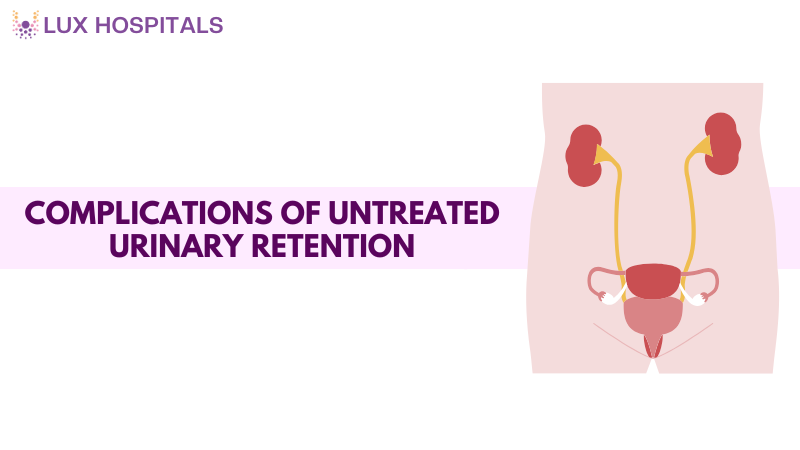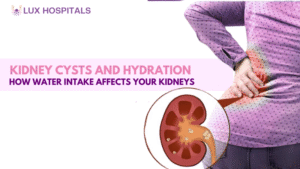Complications of Untreated Urinary Retention

Untreated Urinary Retention is a condition that occurs when the bladder is unable to empty completely or at all, leading to serious urinary and kidney-related complications. The bladder is essential for eliminating waste from the body. When it fails to function correctly, toxins can build up, increasing the risk of infection and kidney disease. Both men and women can experience Untreated Urinary Retention, although it’s more common in men due to prostate issues.
What is Untreated Urinary Retention?
Untreated urinary retention occurs when urine accumulates in the bladder, typically due to obstruction, nerve dysfunction, or weak bladder muscles. This condition can be acute (sudden inability to urinate) or chronic (gradual and incomplete bladder emptying).
If left unmanaged, urine that remains creates a haven for bacteria in the bladder and exerts pressure on the kidneys. This leads to multiple complications affecting the entire urinary system.
Major Health Complications Caused by Untreated Urinary Retention
Urinary retention can lead to several significant health issues affecting the kidneys, bladder, and overall well-being if left unmanaged. When urine remains still in the bladder, bacteria proliferate rapidly. Over time, this can cause irreversible harm to the urinary system and even lead to life-threatening complications. Recognising these risks early is crucial for timely medical care and prevention.
1. Urinary Tract Infections (UTIs)
One of the most common complications of Untreated Urinary Retention is Urinary Tract Infection (UTI). When urine remains stagnant in the bladder, bacteria multiply rapidly.
Key points:
- Repeated infections can cause inflammation and scarring of the urinary tract.
- A burning feeling, fever, hazy urine, and lower abdominal pain are among the symptoms.
- Chronic UTIs can lead to severe complications like kidney infections if ignored.
2. Bladder Damage
When untreated urinary retention persists for an extended period, the bladder becomes overstretched and weakened. The walls lose their elasticity and cannot contract properly to empty urine.
Effects include:
- Reduced bladder capacity.
- Loss of bladder muscle tone.
- Long-term difficulty in urination even after treatment.
Once the bladder is damaged, it may not fully recover, making early intervention essential.
3. Kidney Damage
One of the most dangerous complications of Untreated Urinary Retention is kidney damage. As urine backs up into the kidneys, pressure builds up, leading to a condition known as hydronephrosis.
Possible outcomes:
- Permanent kidney scarring.
- Decline in kidney function over time.
- In severe cases, complete kidney failure requires dialysis.
Regular monitoring and timely medical attention can prevent irreversible kidney injury.
4. Bladder Stones Formation
Stagnant urine in Untreated Urinary Retention often leads to the crystallisation of minerals, forming bladder stones. These stones irritate the bladder lining and block urine flow.
Common symptoms include:
- Frequent urination with pain.
- Blood in urine (hematuria).
- Cloudy or foul-smelling urine.
Bladder stones may require surgical removal if they become too large or cause repeated infections.
5. Chronic Pain and Discomfort
Persistent pelvic or abdominal pain may result from chronic, untreated urinary retention. A persistent sense of fullness or pressure can considerably diminish the quality of life.
Additional issues:
- Discomfort during physical activity.
- Disturbed sleep due to nighttime urination.
- Psychological distress and anxiety from constant bladder issues.
Managing pain through medical intervention and lifestyle adjustments is vital to avoid further complications.
6. Overflow Incontinence
When the bladder becomes overly full due to Untreated Urinary Retention, urine may leak uncontrollably — a condition called overflow incontinence. This occurs because the bladder can no longer hold additional urine.
Consequences include:
- Continuous dribbling of urine.
- Skin irritation or infection from constant moisture.
- Embarrassment and social withdrawal due to leakage.
Early treatment helps restore bladder control and prevent emotional distress.
7. Increased Risk of Sepsis
Suppose Untreated Urinary Retention leads to repeated infections that spread to the bloodstream. In that case, it can result in sepsis, a life-threatening condition.
Warning signs include:
- High fever and chills.
- Rapid heartbeat.
- Confusion or dizziness.
Sepsis requires emergency medical attention to prevent fatal complications.
8. Bladder Diverticula Formation
Prolonged Untreated Urinary Retention can cause small pouches or sacs (diverticula) to form in the bladder wall. Urine is trapped in these sacs, which are easily polluted.
Complications include:
- Increased UTI risk.
- Incomplete bladder emptying.
- Potential bladder wall rupture in extreme cases.
Surgical correction may be necessary if diverticula become large or symptomatic.
9. Impact on Daily Life
Living with untreated urinary retention has an impact on social and emotional well-being in addition to physical health. Pain, leakage, and a constant need to urinate can limit day-to-day activities and reduce self-esteem.
Lifestyle consequences:
- Avoiding social gatherings.
- Reduced work productivity.
- Emotional stress and fatigue.
Seeking treatment early can restore normal urinary function and improve overall quality of life.
10. Long-Term Complications if Left Untreated
If Untreated Urinary Retention continues for years, it can cause permanent damage to the organs. Chronic infections, kidney failure, and bladder dysfunction may require long-term catheterisation or surgery.
Preventive tips:
- Seek prompt evaluation if you experience difficulty urinating.
- Maintain good hydration and hygiene.
- Follow your doctor’s advice for medications or catheter use.
Conclusion
Your kidney and urinary health may suffer significantly if you ignore untreated urine retention. The first step in prevention is awareness—identifying the warning signals, acting quickly, and not postponing medical attention. Untreated urinary retention can be effectively managed with modern urology treatments, restoring patients’ control over their bladder health. For specialised and compassionate urology care, Lux Hospitals provides expert diagnosis and treatment options tailored to each patient’s needs. Their experienced medical team ensures timely intervention and long-term management for a healthier, more comfortable life.
Frequently Asked Questions
If Untreated Urinary Retention is not managed, it can lead to bladder damage, urinary tract infections, kidney problems, and even sepsis. The condition worsens over time, making urination increasingly difficult and painful.
Yes, long-term Untreated Urinary retention can result in urine backing up into the kidneys, which could lead to hydronephrosis and eventual kidney failure. Timely medical intervention can prevent permanent kidney damage.
Untreated Urinary Retention is a serious condition that requires prompt treatment. If ignored, it may result in chronic pain, infections, and loss of bladder function. Seeking medical help early can lead to better recovery outcomes.
Common signs of Untreated Urinary Retention include difficulty starting urination, weak urine stream, a feeling of incomplete emptying, and lower abdominal discomfort. If these symptoms persist, consult a urologist immediately.
Treatment for Untreated Urinary Retention depends on the cause. Options include catheterisation, medications, bladder training, or surgery. A proper diagnosis helps determine the most effective treatment approach.




















